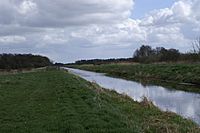Shapwick Heath facts for kids
| Site of Special Scientific Interest | |
 |
|
| Area of Search | Somerset |
|---|---|
| Coordinates | 51°09′33″N 2°48′52″W / 51.1591°N 2.8144°W |
| Interest | Biological |
| Area | 394 hectares (3.94 km2; 1.52 sq mi) |
| Notification | 1967 |
Shapwick Heath is a special natural area in Somerset, England. It covers about 394 hectares (973.6 acres). This place is a Site of Special Scientific Interest (SSSI). It is also a national nature reserve.
Shapwick Heath is located between the villages of Shapwick and Westhay. It was officially recognized as a protected site in 1967. This area is part of a bigger plan called the Brue Valley Living Landscape project. This project started in 2009. Its main goal is to protect and bring back natural habitats. It also helps wildlife thrive, even with climate change. At the same time, it makes sure farmers can still use their land.
Contents
What is Shapwick Heath?
Shapwick Heath is found in the Somerset Levels Wetlands. It is part of an area called the Avalon Marshes. Natural England manages it as a national nature reserve. This area used to be a type of wetland called a "raised bog." It sits in the valley of the River Brue.
Amazing Insects and Wildlife
This special place is home to many different kinds of insects. You can find both land and water insects here. Some very rare insects live at Shapwick Heath. These include the Greater Silver Diving Beetle. Another rare one is the Lesser Silver Diving Beetle. This smaller beetle is now only found in the Brue Basin Peat Moors area.
Ancient History at Shapwick Heath
An ancient path called the Sweet Track crosses through Shapwick Heath. This path is very old. It is one of the oldest engineered roads ever found. It is also the oldest timber trackway discovered in Northern Europe. This means it was built using wood a very long time ago.
Nearby Nature Reserves
Right next to Shapwick Heath is Shapwick Moor. The Hawk and Owl Trust bought this land to make it a nature reserve. To the east of Shapwick Heath, you will find another nature reserve called Ham Wall. These areas together create a large protected space for wildlife.

